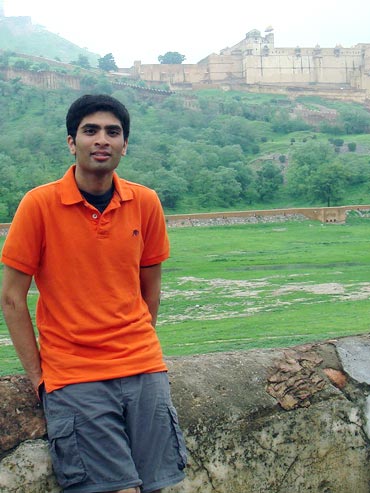Arthur J Pais
As part of an ongoing series, we bring you stories of young Indian Americans who came looking for the Real India and found their real selves instead. Nilay Suresh Shah recounts his trip to India.
Nilay Suresh Shah graduated from the University of Illinois in Chicago with a degree in neuroscience and history. He studies at Northwestern University's Feinberg School of Medicine in a doctor of medicine/master of public health program. He has served as a fellow at the National Institutes of Health and has also taught adults English as a second language:
Under oppressive heat, women dressed in brightly-colored saris traversed the central square, calling out to children who scurried between street vendors, trucks, autorickshaws and the occasional cow travelling seemingly without direction. Shaking my head clear of the barrage on my senses, I turned toward the entrance of a modest, crumbling concrete building, around which people were quietly hovering in the shade.
Approaching the threshold of the Lady Lothian Hospital in Ajmer, I anticipated a change in scenery, expecting quiet, cool order unlike stereotypical daily life in urban Rajasthan.
Inside, however, the scene was no different than the plaza I had left behind. Men, women and children walked through dark hallways showing signs of half-finished construction. I surveyed the corridor, this time expecting to find physicians and nurses perched over recumbent locals seeking treatment. Instead, patients and their families lined the passageways, awaiting their turn from the short-staffed medical professionals.
Stepping gingerly over a woman reclined on the floor so as not to disturb her sleep, I searched for the physicians in the hospital, my na ve Western eyes wondering how anyone could organise such an overwhelming disarray of patients. Along a hallway near the back of the small building was a large group, speaking loudly over one another to get the attention of two physicians sitting in the center.
A quick word was all the physicians could afford to give, but in the short amount of time I interacted with them I came to understand an incredible amount about life in India. At the center of the room was the head physician, surrounded by a throng of women wearing colorful veils and men lined up out the door. He spoke gently, calmly and with unmistakable passion for the important work he was doing for the city's afflicted poor.
I learned that government-imposed limits prevented adequate staffing of this public hospital; that access to geriatric and maternal healthcare were the biggest challenges faced by the hospital staff; and that there was no time for modesty within the hospital, where equipment for medical, pediatric, and obstetrics visits were housed in the same room.
More than that, however, I learned how these physicians' keen resourcefulness allowed them to maximise the number of patients treated with what few resources they had. As a medical student, I was in awe of how people at the hospital, physicians and patients alike, learned to live without the things that we in Westernised countries take for granted access to health care, medicine and adequate facilities. The head physician's ability to bring order out of chaos was remarkable an ease in his demeanor, something unspoken, calmed the crowd of people waiting in the back room.
As I crossed the threshold back into the bustling marketplace, I began to sense a newfound appreciation of the spirit of Indian life. Despite being everyday occurrences for the people in the hospital, I learned much about how people in India persevere from the transient glimpse I had of a few moments of their lives.
There is much to be gained by appreciating the perspective of someone who does not experience the world as we do, and during my time in Rajasthan I came to realise that it is an understanding of these nuances that strengthens the bonds of our existence across cultural and socioeconomic lines.


Comment
article